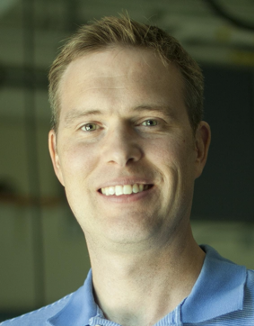Aaron Bradshaw currently serves in both the Civil and Environmental Engineering and Ocean Engineering departments at the University of Rhode Island, and his research interests lie in marine geotechnics. Here, he describes his passion for ocean engineering, and encourages students of the ocean environment, be their focus offshore renewable energy or other areas, to both learn the basics and “follow their bliss.”
Put on the spot to provide his best advice to students preparing for their futures, Aaron Bradshaw, a civil engineering academic within two University of Rhode Island (URI) departments – Civil and Environmental Engineering (C&EE) and Ocean Engineering (OE) – deliberates only a moment before sharing straightforward guidance: “Learn the fundamentals,” he says. “Doing so has served me well.”
Bradshaw, who often counsels students in his role as C&EE Undergraduate Director, learned that lesson as a student himself, from a professor of a statics course he undertook as an undergraduate pursuing a civil engineering degree from Tufts University, in his home state of Massachusetts. Although he hadn’t initially thought of moving further into the academic realm, he ultimately embarked on graduate school at URI. Studying ocean and civil engineering, he continued to learn the fundamentals, immersing himself in research efforts that included work in the Gulf of Mexico.
That effort, in great part, solidified his passion for exploring the nexus of human-made structures within and alongside the marine environment. “It was an absolutely life-changing experience,” says Bradshaw, thinking back. “From the field work to the hands-on laboratory experiences, it was there that I found out that this was what really suited me.”
Port and harbor development intrigued him, and, increasingly, the arena of offshore renewable energy, with its challenges and opportunities focused on provided clean and reliable electricity to coastal communities and beyond. “This is where my happy place is,” he says.
Since coming to work at URI, Bradshaw has focused on marine geotechnics – for example, the degree to which certain kinds of soils in the marine environment are able to support manmade structures – and he has enjoyed teaching courses in soil mechanics, foundations, marine geotechnics, and geotechnical earthquake engineering.
He says ocean engineering, including its context with offshore renewable energy, is a rapidly changing and growing field, with much to offer the world in terms of improving people’s lives and the integrity of the marine environment. “There’s still so much we’re learning, so much more to do,” he says. “We need the next generation to be a part of this.”
And he engages with students, encouraging them to, just as he did, master the basics – those fundamentals – of their areas of study, but also to pay attention to what stirs their blood. “Follow your bliss, find your passion,” he says. “The ocean environment, whether it’s offshore renewable energy or another field or aspect, has so much to offer students, and you’re very much needed.”
View Expert Profile
